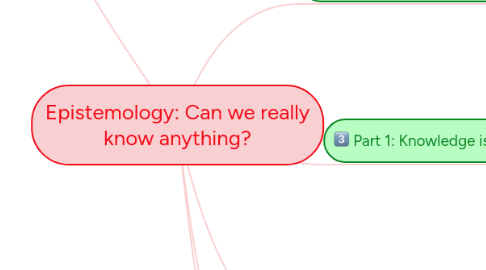Epistemology: Can we really know anything?
by Anna Bromely


1. Plato's doubts about knowledge
1.1. Theaetetus: What is knowledge? This text is aporetic. It ends in an impasse. This socratic dialogue asks questions of the what is form such as what is courage, self-control, justice? Positive metaphysical forms in Plato's theory of forms. He then abandoned the certainties and returned to a more sceptical manner
2. A side note on Socrates
2.1. Socrates uses a maiutic philosophy where he helps other people get knowledge through questioning even though he himself does not have any. "But the delivery is heaven's work and mine." "I practise my mother's art of midwifery."
3. The over-all strategy of Theaetetus
3.1. There are 3 answers to the question 'What is knowledge'. These include perception or how things seem to be, true judgement or true belief and true judgement with an account or in other words true belief with an explanation. The aporia ends in a kind of impasse. But one in which you are better off for having faced your own ignorance.
4. Part 1: Knowledge is perception
4.1. There appears to be a distinction of seeing into two strands, that of a simple seeing and the more complex component of judgement. Knowing something requires the powers of the soul. Abstraction and judgement are needed to be aware of anything and especially aware of anything as something.
5. Part 2: Knowledge is true judgement
5.1. Here the negative question is posed can we have false judgement? It is easy to get bogged down in this. There are three failures of epistemic judgement:
5.1.1. The wax tablet: the truth is too difficult to read
5.1.2. The aviary: the truth gets mixed up and turns false. Catching birds in a cage
5.1.3. The jury: people can be deliberately misled.
6. Part 3: Knowledge is true judgement with an account
6.1. true belief with an explanation. Dream theory.
6.1.1. An account of the complexes that analyses them into there simple components
